Want to attend the course but can’t make it on this date?
Fill in your details below and we’ll notify you when we next present a course in this area:
Most of our major corporate clients who have large sites and hundreds of staff members, like to ensure that they have at least two or more trained snake removers on every shift. Eliminating hazards to staff on-site is part of nearly every occupational health and safety act and a number of companies take minimizing risk to staff very seriously.
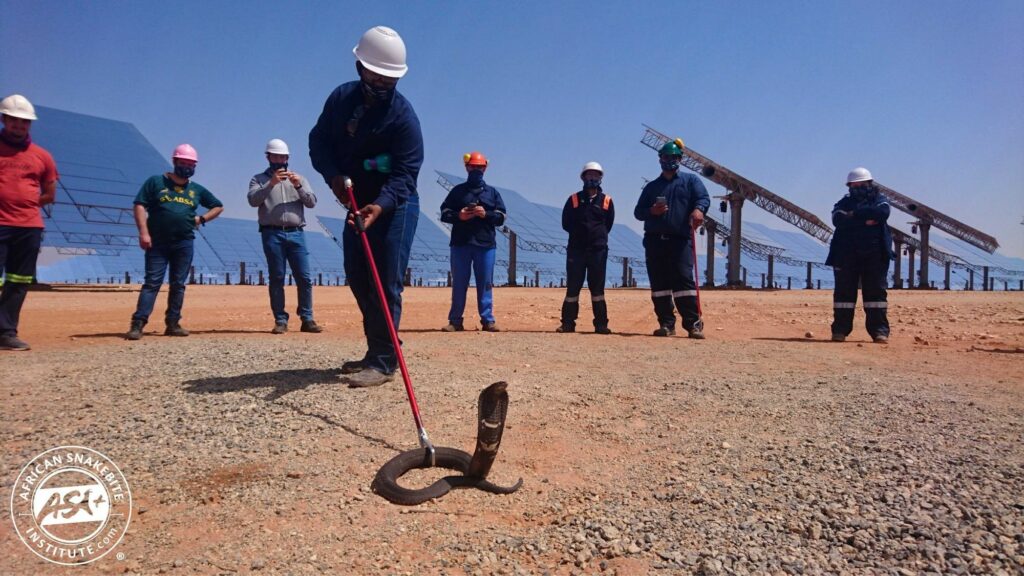
Snakes in the workplace can prove both an extreme hazard and, if the site is not prepared on how to deal with such encounters, cause panic and major disruptions to production. However, snake encounters can largely be mitigated with proper training and awareness.
With correct training and protocols, removal of a snake from a site should be safe for both the animal and the remover. There are a number of snake awareness, first aid for snakebite and venomous snake handling training providers in Africa, but disturbingly a number of them do not teach the safest protocols.
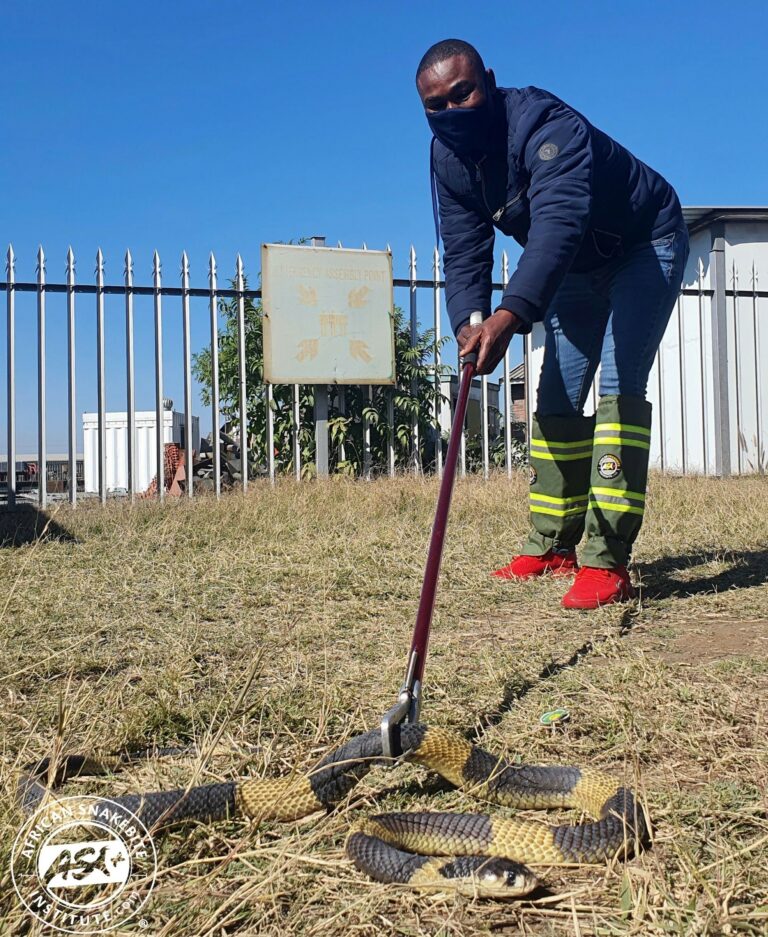
Snake removal should be conducted with the appropriate snake handling equipment such as snake tongs, snake hooks, eye protection and some form of approved container. To reduce the risks of snakebite, physical contact with snakes should not be allowed. If the snake handler has access to the correct snake removal equipment, physical contact can be avoided, and the chances of snakebite during removal are reduced dramatically. PPE such as snake gaiters can also be worn to further reduce the risk of a bite.
Snakebite in Africa can be extremely expensive to treat, with bills running from over R100,000 ($6500 USD) to in excess of R1 000 0000 ($65,000 USD). We are currently experiencing an extreme shortage of SAIMR Polyvalent antivenom – used to treat bites from most of the highly venomous cobras, mambas and adders and not all hospitals carry sufficient stock to treat serious bites.
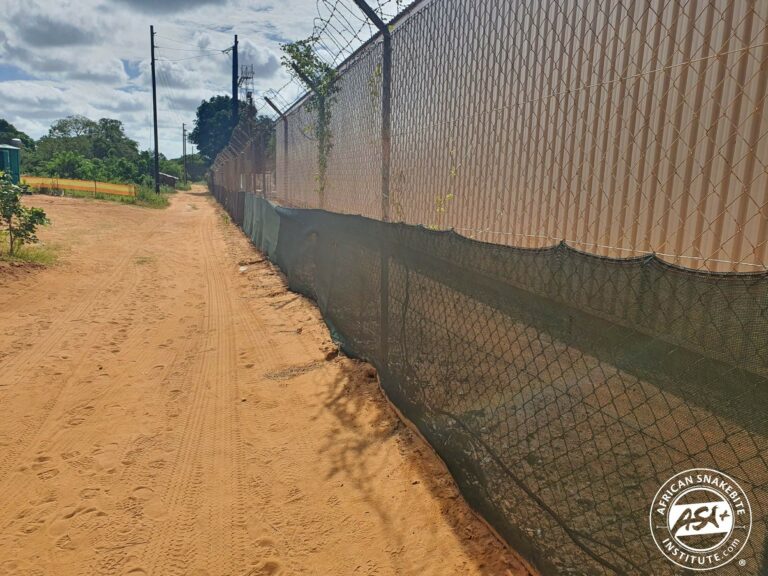
What to do in snake encounters?
1. If a snake is seen on site, immediately move away a safe distance of 5 meters or more. Keep calm and watch the snake as they are quick to disappear.
2. Notify a supervisor or management about the presence of the snake. Watch the snake until a certified snake remover arrives.
3. The snake must be removed by a certified snake remover with the correct snake handling equipment. The snake must be captured and containerised in a manner that is safe for both the snake remover and the snake. At no stage should there be any physical contact with any snake.
4. The snake must immediately be removed and released in a suitable habitat away from people.
How to minimize snakes on site?
Snakes are largely attracted to sites when seeking food, water or shelter. To minimize the number of snakes on site you need to address these attractants:
1. Keep the site clean. Snakes are attracted to food such as rodents and frogs which are attracted by refuse, rubble, water puddles and food.
2. Remove piles of unused rubble, wood, corrugated iron, asbestos sheeting and the like.
3. Elevate containers and large equipment off the ground on concrete blocks or bricks to minimise tight, dark hiding spots below.
4. Remove dense vegetation around buildings including long grass and bushes or hedges growing close to windows.
5. Make sure doors to offices and accommodation units seal fully so that snakes cannot enter under doors.
6. Wrapping shade cloth a meter high around the outside of a perimeter fence and burying it 20 cm into the ground can drastically reduce the number of snakes that enter the site.
With the correct training and equipment, removing snakes from site is largely a straightforward procedure. The African Snakebite Institute trains thousands of people a year across 19 African countries in snake awareness, venomous snake handling and first aid for snakebite. We are the largest supplier of quality snake handling equipment in Africa. Contact us for more information on snake awareness and venomous snake handling training, and snake handling and safety equipment.

The African Snakebite Institute is the leading training provider of snake awareness, first aid for snakebite and Venomous snake handling in Africa.
We offer training to corporate clients across various industries, including mining, solar and wind farms, government departments, construction companies, game lodges, anti-poaching units and hospitals across the continent.
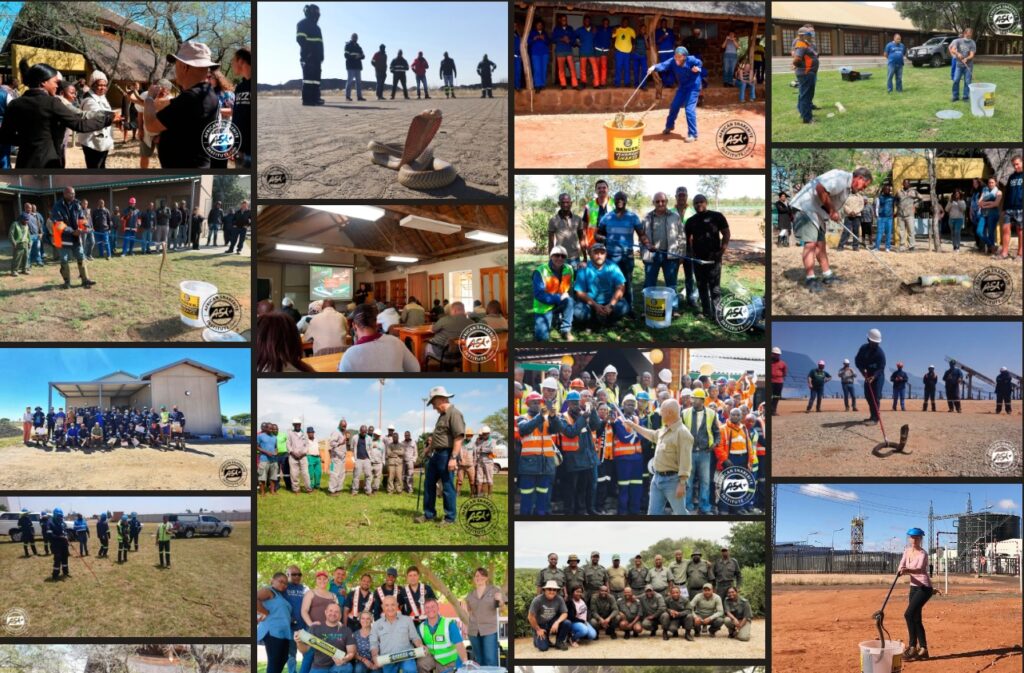
SOUTH AFRICA AFRICA
We offer on-site training to companies throughout South Africa. We offer on-site training in 19 African countries!
Click here to view the full course info Click here to view the full course info

The African Snakebite Institute is the leading provider of quality snake handling equipment on the continent. We stock 15 different options on snake tongs, 10 kinds of snake hooks, 16 different snake gaiters, snake tubes, buckets, bags, books and a wide range of first aid for snakebite kits.
View all our products on our online shop here.
CONTACT US:
Product enquiries:
Caylen White
+27 60 957 2713
info@asiorg.co.za
Public Courses and Corporate training:
Michelle Pretorius
+27 64 704 7229
courses@asiorg.co.za
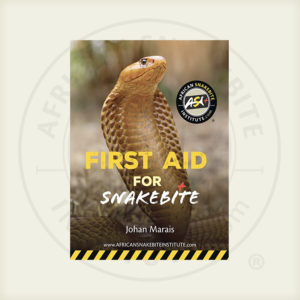 ASI First Aid for Snakebite Booklet
R40.00
ASI First Aid for Snakebite Booklet
R40.00
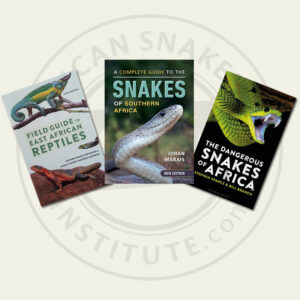 ASI Book Combo 2
ASI Book Combo 2
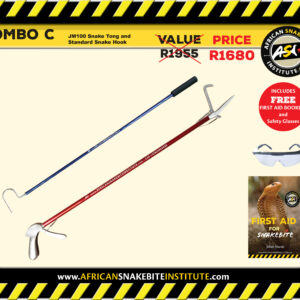 ASI Combo C
R1,680.00
ASI Combo C
R1,680.00
Want to attend the course but can’t make it on this date?
Fill in your details below and we’ll notify you when we next present a course in this area:
Want to attend the course but can’t make it on this date?
Fill in your details below and we’ll notify you when we next present a course in this area:
Want to attend the course but can’t make it on this date?
Fill in your details below and we’ll notify you when we next present a course in this area:
Want to attend the course but can’t make it on this date?
Fill in your details below and we’ll notify you when we next present a course in this area:
Want to attend the course but can’t make it on this date?
Fill in your details below and we’ll notify you when we next present a course in this area:
Want to attend the course but can’t make it on this date?
Fill in your details below and we’ll notify you when we next present a course in this area:
Want to attend the course but can’t make it on this date?
Fill in your details below and we’ll notify you when we next present a course in this area:
Want to attend the course but can’t make it on this date?
Fill in your details below and we’ll notify you when we next present a course in this area:
Want to attend the course but can’t make it on this date?
Fill in your details below and we’ll notify you when we next present a course in this area:
Sign up to have our free monthly newsletter delivered to your inbox:
Before you download this resource, please enter your details:
Before you download this resource, would you like to join our email newsletter list?